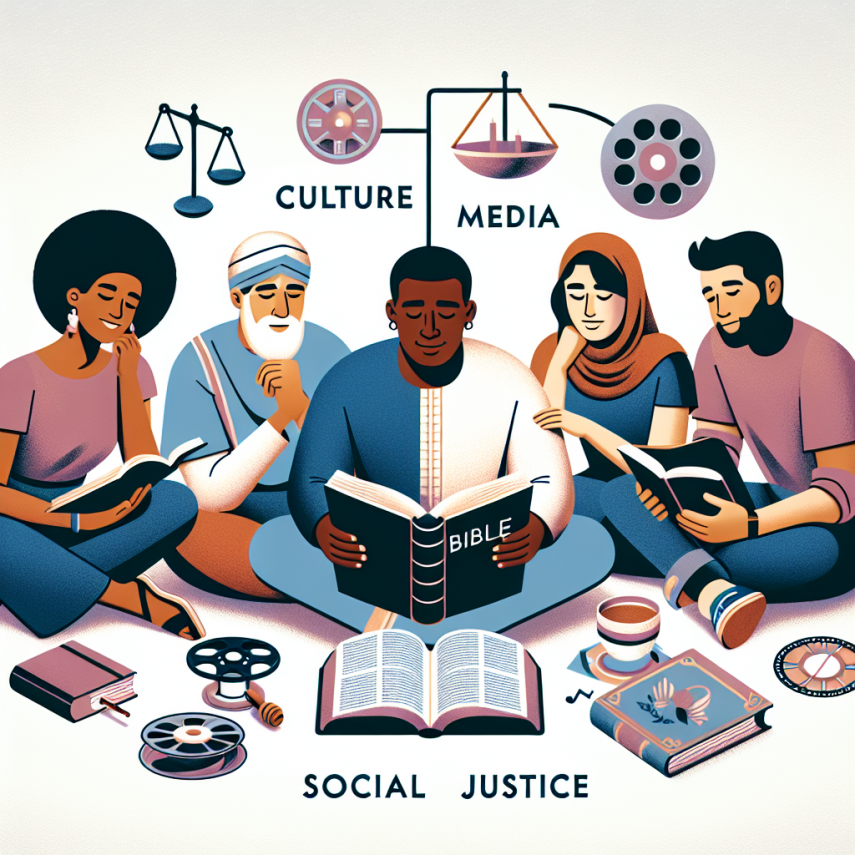“`html
Engaging with Culture: A Christian’s Responsibility Amid Social and Technological Change
In today’s rapidly evolving world, Christians find themselves at a cultural crossroads. Society is moving at breakneck speed, ushering in new technologies, shifting social norms, and reimagining ethical boundaries. As Christians, how do we engage with this complexity without losing sight of our core beliefs? How do we balance truth and grace while influencing culture rather than being consumed by it?
In my previous article on historical Christian movements, I explored how pivotal moments in faith shaped Christian identity. As we navigate modern society, I believe we are called to engage with today’s culture with the same transformative power. Guided by scripture, we must remain firm in our beliefs, even as we thoughtfully participate in societal evolution.
Embracing Biblical Teachings While Engaging with Media
The media today is immensely influential. Social media, news outlets, movies, and television shape much of our perception of reality—often driving ideological shifts and shaping values. As believers, we must ask ourselves: How do we interact with this form of cultural engagement in a way that reflects Christ’s teachings?
Philippians 4:8 reminds us, “Finally, brothers and sisters, whatever is true, whatever is noble, whatever is right, whatever is pure, whatever is lovely, whatever is admirable—if anything is excellent or praiseworthy—think about such things.” This verse invites Christians to discern carefully what we consume and contribute through media platforms. Instead of merely absorbing content, we should reflect biblical principles in what we create, post, or support.

Dealing with the Challenges of Technology and Faith
Our interaction with technology is probably one of the biggest modern-day challenges. Digital transformation and AI advancements present an incredible opportunity for innovation, but they also raise ethical concerns regarding privacy, control, and how these technologies impact humanity. Having a background in AI and machine learning myself, I’ve grappled with the tension between innovation and ethical responsibility.
We see in the Bible that technology alone is neither good nor evil; it is the heart behind it and how we choose to wield it that defines its impact. As stewards of God’s creation, we have a duty not just to innovate but to ensure those innovations uplift human dignity, respect privacy, and foster community. A passage that continues to resonate with me in this regard is Proverbs 16:9: “The heart of man plans his way, but the Lord establishes his steps.” This reminds me that our efforts in technological advancement must be rooted in humility and guided by divine wisdom, ensuring they reflect compassion and justice.
Balancing Christian Ethics with Social Justice
As many of us have witnessed, society’s increasing focus on social justice brings both opportunities and challenges to the forefront. Issues such as poverty, inequality, and systemic injustice demand our attention. Throughout my own journey, particularly in times of adversity and isolation, I’ve come to understand how integral the Christian call to justice is. Standing face-to-face with injustice, whether in my travels abroad or conversations at home, forces me to confront the depths of Christ’s teachings about justice, grace, and mercy.
Matthew 25:40 offers profound guidance for how we should relate to those who suffer the most: “Amen, I say to you, whatever you did for one of the least of these brothers and sisters of mine, you did for me.” Our faith requires us to be champions of the oppressed, just as Jesus advocated for the marginalized during His time on earth. But how do we balance advocacy with grace? How do we offer correction to societal injustices without falling into bitterness or divisiveness?

Examples of Engagement
I’ve found that one of the key ways Christians can engage with social issues constructively is by bringing a “both/and” approach rather than an “either/or” mindset. For instance, addressing poverty should involve both systemic reform and personal acts of kindness. Christians are called to mobilize their communities, work with NGOs, and influence policymakers while also practicing mercy at an individual level. In practice, here are some steps we can take to engage constructively:
- Advocate for Biblical Justice: Seek out ways to influence society through biblical values, whether engaging in civil discourse, supporting pro-justice legislation, or organizing community outreach events within the church.
- Practice Radical Compassion: Just as Christ showed compassion to the broken, direct your efforts toward meeting the basic needs of those suffering from systemic injustice. This can be as simple as donating to a charity or mentoring at-risk youth in your city.
- Seek Understanding Before Action: Before reacting, take time to understand the root of social issues. Whether concerning race, gender inequality, or economic disparity, prayerfully consult scripture and converse with those affected to inform your response.
This ‘engagement’ requires an awareness that navigating between truth and grace, justice and mercy, will always be challenging. However, as Christians, we are called to be salt and light in this complicated world, offering a vision rooted in Christ’s love and compassion.
The Role of Faith in Engaging with Complex Cultural Issues
In a recent article on key theological developments, I highlighted that history shows us adaptability in Christianity without compromise of doctrine. In engaging with today’s cultural and media landscapes, we once again find ourselves called to adapt and apply biblical truths in new ways—without letting go of our core convictions. Our faith compels us not only to articulate what we believe but to embody those beliefs in our actions.
I encourage readers, as with other articles on spiritual disciplines, to be conscious of how they interact with culture. Regularly practicing discernment through prayer, engaging with scripture, and finding community with other believers are essential to staying grounded while navigating these issues.

Personal Reflections and An Invitation
Throughout my journey, I’ve faced uncertainties around faith in a technological world, grappled with the ethics of AI, and confronted social issues such as poverty and injustice. Yet, it’s through facing these complexities that I’ve experienced the profound reality of Christ’s teachings. I’ve learned that while engagement with culture can be messy and complex, it’s also an avenue for grace, transformation, and reflection of the Kingdom of God.
I’m inviting you, dear reader, to consider your own engagement with modern society. How do your choices reflect your faith in this ever-shifting cultural landscape? What steps can you take today to ensure that your relationship with media, technology, and social justice aligns with your belief in Christ’s truth and compassion? Let’s start conversations in our communities, engage in prayer, and commit to being agents of God’s love in both small and significant ways.
In closing, I echo the need for careful consideration of the role we play in our world. Let us not shy away from engaging with culture and media but instead approach it as an opportunity to be witnesses of Christ’s transformative message of truth, justice, and mercy.
Focus Keyphrase: Engaging with Culture and Media
“`




In this article, I’ve sought to lay out a framework for how we as Christians can meaningfully engage with a complex and changing world while maintaining a firm grounding in scripture. Whether it’s through the responsible use of technology or proactive involvement in social justice issues, our faith should be a beacon of light and hope.
I really appreciated this nuanced approach to how Christians should engage with both technology and social justice. As someone who works in education and navigates tough discussions with my students, this perspective helps me reconcile my faith with my desire for greater social equity. The idea of balancing grace with justice resonates deeply with me. Yet, I wonder—how do we ensure that our churches remain inclusive spaces while addressing these cultural challenges?